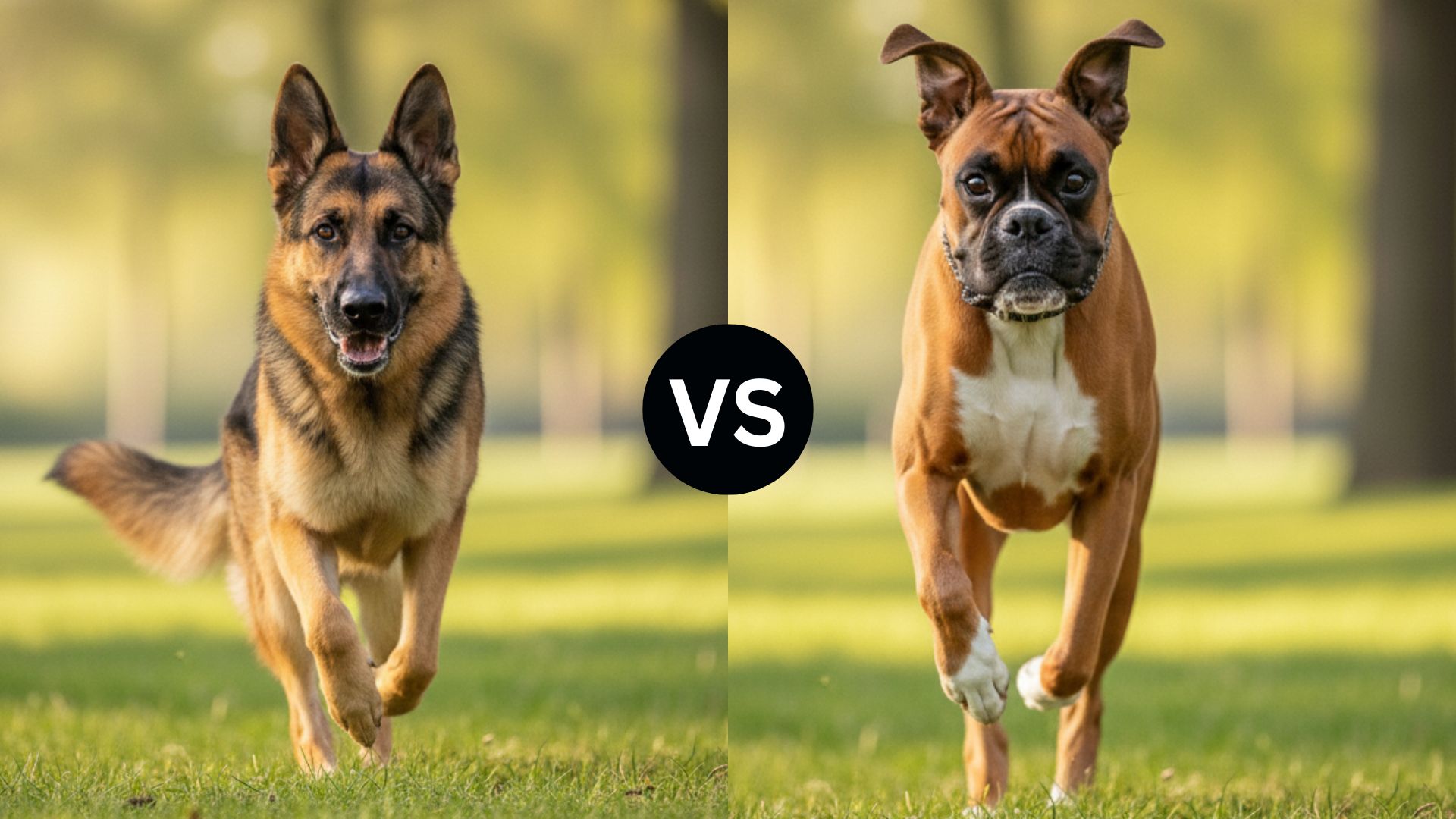When it comes to choosing an intelligent, alert, and protective dog, there are many breeds to consider. German Shepherd and Boxer dogs are two of them. Both Boxers and German Shepherds are loved for their loyalty and alert nature.
Both breeds are valued by pet lovers, but German Shepherds are a bit more popular than Boxers. German Shepherds and Boxers are admired all around the world due to their courageous and loving personality.
Both breeds are very smart and eager to please, which makes it easier to train them. Although both breeds do not look very similar, at least from their looks, they share some behavioral traits. This article highlights the similarities and differences between German Shepherds and Boxers.
Have a look at a comparison between the physical and behavioral characteristics of German Shepherds and Boxer dogs.
German Shepherd vs. Boxer
Origin and Working Background
Both German Shepherds and Boxers have a common country of origin, Germany. Having Brabanter Bullenbeisser (a breed that is now extinct) and Bulldogs as its ancestors, the first Boxer named “Flocki” appeared in a dog show in the 1890s.
On the other hand, the first German Shepherd dog named “Horand von Grafath” was introduced in a dog show in 1882. They were brought to America in 1906 for the first time. The key difference lies in their working background.
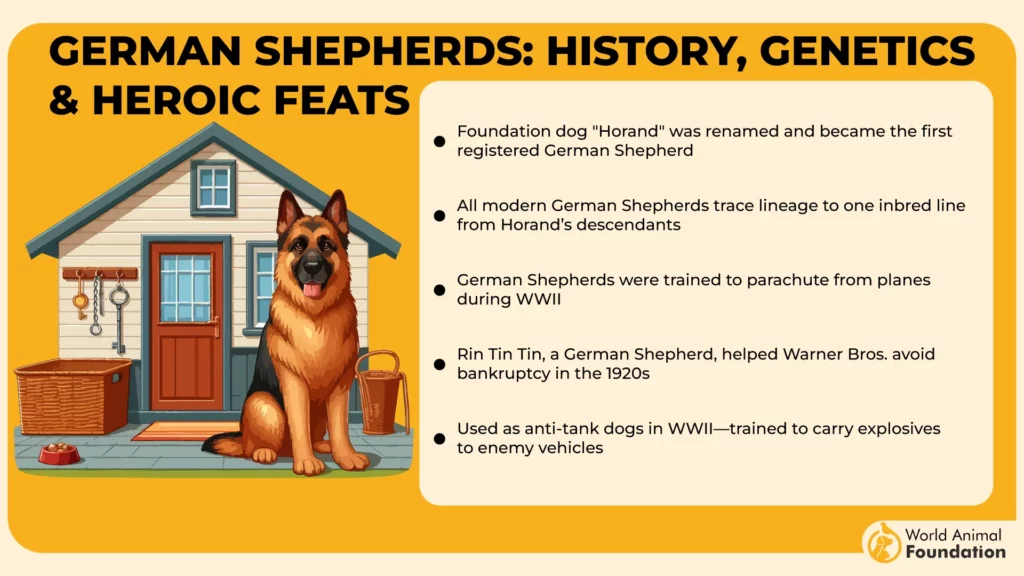
German Shepherds were originally bred for herding sheep, explains PetPlan. Later, they were used as war dogs in World Wars I and II. When the war was over, people started training German Shepherds as service dogs for blinded veterans.
Like GSDs, Boxers are also working dogs that were originally bred for hunting large prey. They were also used in bull baiting and dog fighting. Later, these cruel sports were banned, and the Boxer breed became the ultimate family pet.
Size and Build Differences
German Shepherds are muscular and large dogs having an agile build, whereas Boxers are medium to large-sized dogs. Boxers are also agile, quick, and muscular dogs, just like German Shepherds. GSDs have longer faces compared to Boxers.
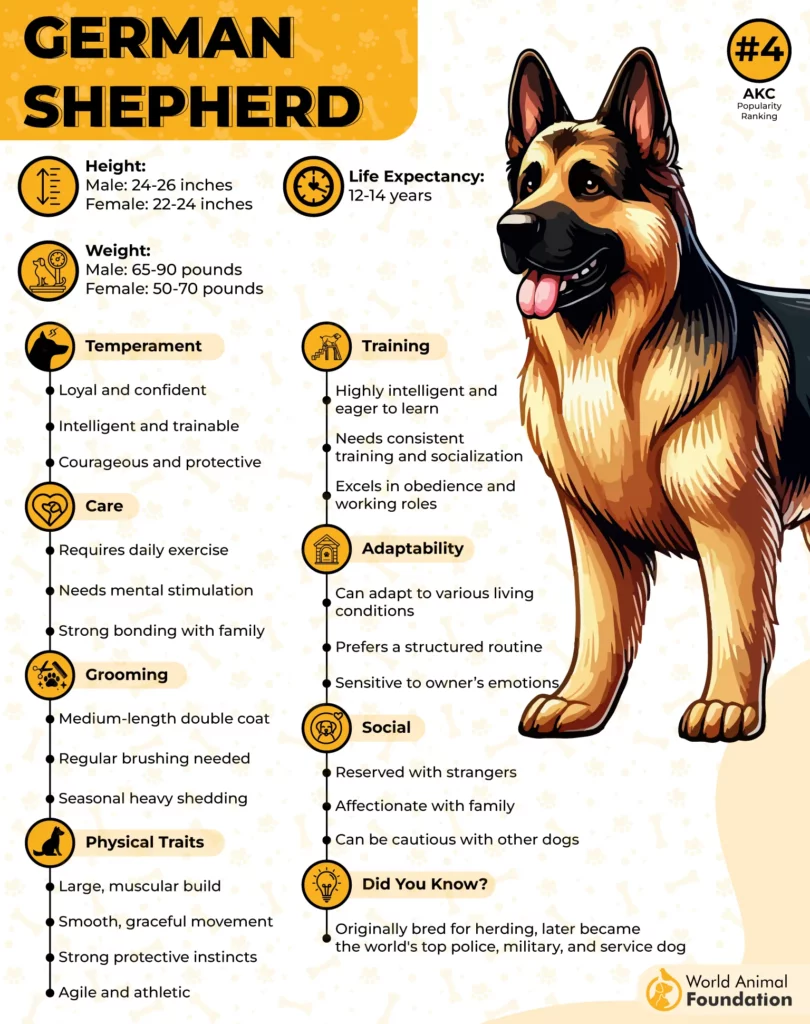
Moreover, their ears stand erect compared to the floppy ears of the Boxer. Boxers have a short muzzle and are brachycephalic.
Both breeds have powerful jaws and strong bite force, with which they can cause serious injuries to their opponents. Boxers are relatively more deep-chested than German Shepherds, who have moderately deep and broad chests.
Coat Requirements
Boxers have single short coats without the insulating undercoat. They do not shed much and are quite low-maintenance in terms of grooming. Brushing once a week using a rubber brush or a hound glove would suffice.
Boxer dogs should be taken out only in moderate temperatures, as they cannot tolerate extremely hot or cold weather.
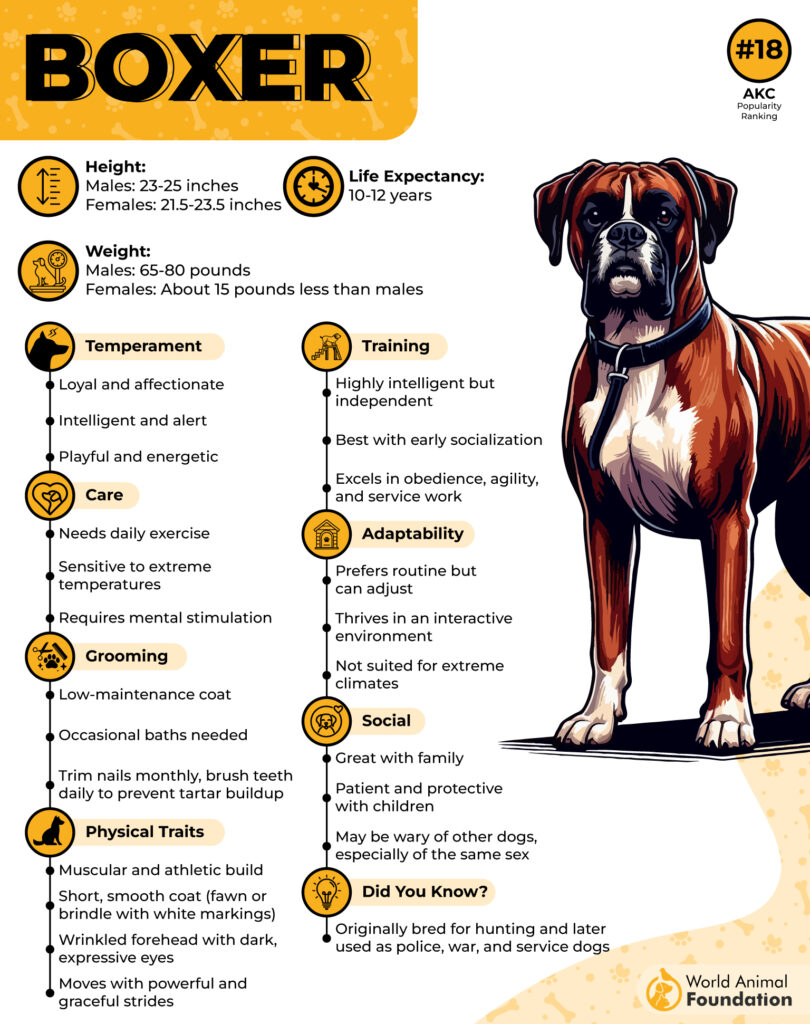
On the other hand, German Shepherds have a thick double coat that acts as an insulator, explains the American Kennel Club. It keeps them cool in summer and warm in winter. However, the medium-length coat sheds a lot, so it needs to be brushed every day using a pin brush.
Temperament & Family Fit
Every dog has its own unique personality, but German Shepherds and Boxers have some behavioral traits in common. For instance, both breeds are immensely loyal to their owners and love them deeply. They can develop separation anxiety when left alone for too long.
Boxers are playful and gregarious around the people they know. German Shepherds are also very playful with their loved ones, but they like to sit back and observe.
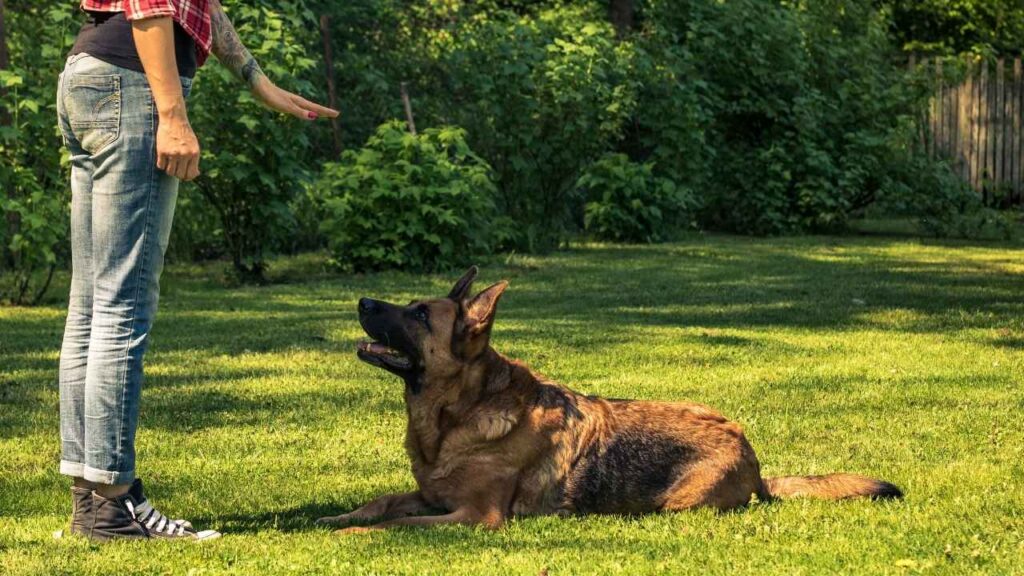
They are more alert to their surroundings. Both breeds are quite sensitive and are capable of understanding the changes in their owners’ moods and emotions. It makes them good therapy dogs, but German Shepherds are more commonly used for therapy work.
Boxer dogs need to socialize a lot compared to German Shepherds, who have an average need for socialization. German Shepherds are not avid explorers, whereas Boxers have a potential for wanderlust. The former has a higher prey drive and loves to chase and catch.
Energy, Exercise & Trainability
Ranking second in the American Kennel Club’s list of the smartest dog breeds, German Shepherds learn new tricks and commands very quickly. They love to learn and please their family members with new tricks. That is why they are highly trainable.
Although Boxers may not be as intelligent as German Shepherds, they also learn quickly and respond well to reward-based training. Training should begin with basic commands like sit, stay, and come.

Both German Shepherds and Boxers are high-energy canines and need lots of exercise for physical and mental stimulation. These active and athletic dogs require at least one and a half to two hours of daily exercise to stay healthy and content.
While Boxers enjoy activities like flyball and frisbee, German Shepherds love to swim, play hide and seek, and find missing objects.
Health Concerns & Lifespan
Both Boxers and German Shepherds are susceptible to joint disease called elbow and hip dysplasia, like many other large dog breeds. According to PetMD, Boxers are prone to a condition called dilated cardiomyopathy.
One of the major symptoms of this disease is an irregular heartbeat. Other health concerns in Boxers include cancer, aortic stenosis, gastric dilatation volvulus, and intestinal problems. German Shepherds can also develop cancer and bloat.
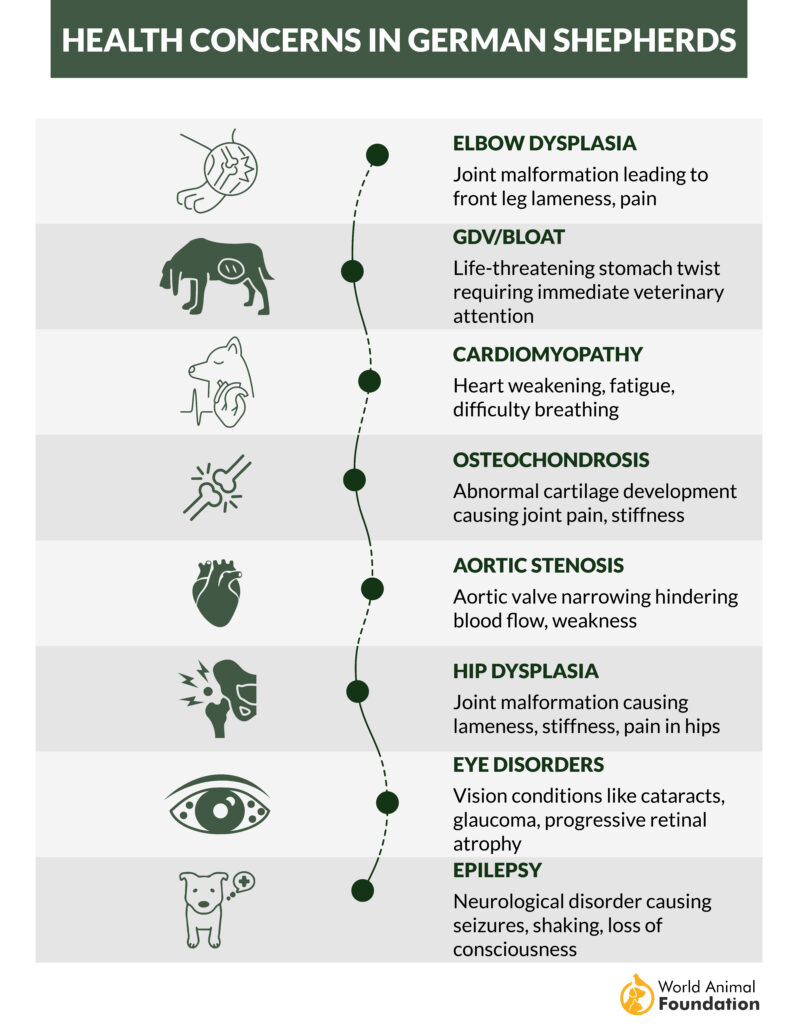
They are also susceptible to orthopedic problems like osteochondritis and cruciate ligament rupture. Digestive problems like chronic diarrhea and colitis are also common. Both breeds are also susceptible to allergies.
Guard/Working Ability
They also tend to be protective of their owners and wary of strangers. Boxers and German Shepherds both make excellent guard dogs. They can detect and threaten away potential owners and are territorial.

However, German Shepherds are better suited for the role of guard dogs due to their high intelligence and remarkable courage. Apart from being guard dogs, GSDs and Boxers are versatile dog breeds well-suited for the roles of military dogs and police dogs.
German Shepherds have a keen focus and strong sense of smell, due to which they are an important part of search and rescue missions. They help in bomb detection and sniffing contraband at the airports.
Which one is better for you?
Both Boxers and German Shepherd dogs are well-suited for active owners who can keep up with their exercise needs. Both breeds are extremely loving and affectionate, so they do well in homes with children.
If you are looking for a better guard dog, you should adopt a German Shepherd. But if you are looking for a protective dog and a calm companion, you should adopt a Boxer. No matter what breed you adopt, make sure to start training and socialization from a young age.
Conclusion
Boxers and German Shepherds have distinct appearances, but they do have some behavioral similarities. Both are loving and loyal to their humans and form strong bonds with them, but German Shepherds are more protective of their owners and make better guard dogs.
Boxers can also serve as guard dogs, but are calmer than GSDs. The two breeds tend to be very energetic and require plenty of exercise for physical and mental stimulation. Thanks to their athleticism and endurance, they are well-suited for military and police work.
However, GSDs have an excellent sense of smell and have been working with search and rescue squads for decades. Both breeds make fun companions, but the final choice of the right dog breed ultimately depends on your lifestyle and your personal preferences.


